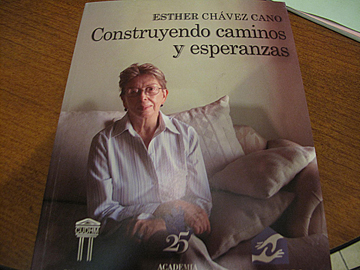Esther Chavez Cano remembered as a powerful force for women in Juarez
|
EL PASO — Esther Chavez Cano fought in Juarez against an epidemic of violence that killed 1,192 women during the last 18 years in what became known as the feminicidios. Chavez Cano, who died in 2009, was remembered in El Paso February 25 as a beacon of hope for women in Juarez. “She was a symbol of accomplishment, social commitment and change,” said Dr. Moira Murphy, a Professor at the University of Texas at El Paso (UTEP). Chavez Cano was a human rights activist who brought attention to terrible violence committed against women and children in Juarez, Mexico, a city in a fight against drugs, corruption, and murder. Chavez worked endlessly assisting families of women who were murdered or the survivors of violence.
